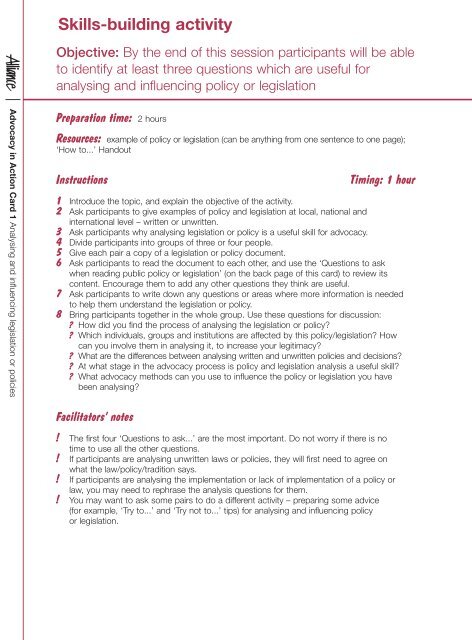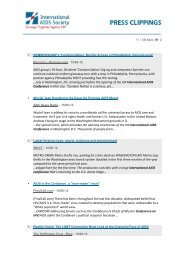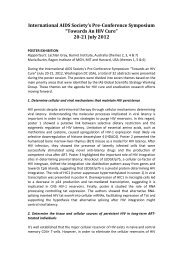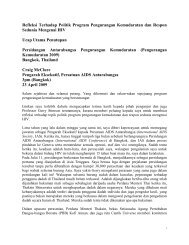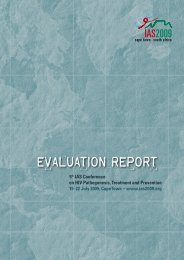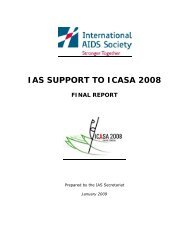Advocacy in Action - International AIDS Society
Advocacy in Action - International AIDS Society
Advocacy in Action - International AIDS Society
Create successful ePaper yourself
Turn your PDF publications into a flip-book with our unique Google optimized e-Paper software.
Skills-build<strong>in</strong>g activity<br />
Objective: By the end of this session participants will be able<br />
to identify at least three questions which are useful for<br />
analys<strong>in</strong>g and <strong>in</strong>fluenc<strong>in</strong>g policy or legislation<br />
<strong>Advocacy</strong> <strong>in</strong> <strong>Action</strong> Card 1 Analys<strong>in</strong>g and <strong>in</strong>fluenc<strong>in</strong>g legislation or policies<br />
Preparation time: 2 hours<br />
Resources: example of policy or legislation (can be anyth<strong>in</strong>g from one sentence to one page);<br />
‘How to...’ Handout<br />
Instructions<br />
Tim<strong>in</strong>g: 1 hour<br />
1 Introduce the topic, and expla<strong>in</strong> the objective of the activity.<br />
2 Ask participants to give examples of policy and legislation at local, national and<br />
<strong>in</strong>ternational level – written or unwritten.<br />
3 Ask participants why analys<strong>in</strong>g legislation or policy is a useful skill for advocacy.<br />
4 Divide participants <strong>in</strong>to groups of three or four people.<br />
5 Give each pair a copy of a legislation or policy document.<br />
6 Ask participants to read the document to each other, and use the ‘Questions to ask<br />
when read<strong>in</strong>g public policy or legislation’ (on the back page of this card) to review its<br />
content. Encourage them to add any other questions they th<strong>in</strong>k are useful.<br />
7 Ask participants to write down any questions or areas where more <strong>in</strong>formation is needed<br />
to help them understand the legislation or policy.<br />
8 Br<strong>in</strong>g participants together <strong>in</strong> the whole group. Use these questions for discussion:<br />
? How did you f<strong>in</strong>d the process of analys<strong>in</strong>g the legislation or policy?<br />
? Which <strong>in</strong>dividuals, groups and <strong>in</strong>stitutions are affected by this policy/legislation? How<br />
can you <strong>in</strong>volve them <strong>in</strong> analys<strong>in</strong>g it, to <strong>in</strong>crease your legitimacy?<br />
? What are the differences between analys<strong>in</strong>g written and unwritten policies and decisions?<br />
? At what stage <strong>in</strong> the advocacy process is policy and legislation analysis a useful skill?<br />
? What advocacy methods can you use to <strong>in</strong>fluence the policy or legislation you have<br />
been analys<strong>in</strong>g?<br />
Facilitators’ notes<br />
! The first four ‘Questions to ask...’ are the most important. Do not worry if there is no<br />
time to use all the other questions.<br />
! If participants are analys<strong>in</strong>g unwritten laws or policies, they will first need to agree on<br />
what the law/policy/tradition says.<br />
! If participants are analys<strong>in</strong>g the implementation or lack of implementation of a policy or<br />
law, you may need to rephrase the analysis questions for them.<br />
! You may want to ask some pairs to do a different activity – prepar<strong>in</strong>g some advice<br />
(for example, ‘Try to...’ and ‘Try not to...’ tips) for analys<strong>in</strong>g and <strong>in</strong>fluenc<strong>in</strong>g policy<br />
or legislation.


